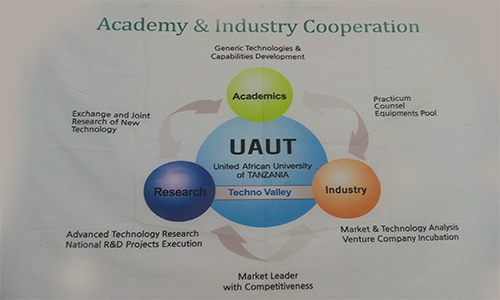
Our core research & collaboration strategies set out how we propose to build upon UAUT’s existing strengths and share the knowledge we create with the wider world. They are also informed, as relevant, by our new overarching priorities. Each strategy is expressed as a series of commitments.
1. Research
1.1 Research commitment 1
To maintain originality, significance and rigor in research within a framework of the highest standards of infrastructure, training, and integrity.
UAUT believes that deciding what to research on is a matter for the individual researcher or research group. This belief reflects the value we accord to the principle of academic freedom, enabling the pursuit of academic enquiry subject to the norms and standards of scholarly undertaking, without interference or penalty. This freedom to seek out truth and understanding, whether through theoretical or empirical means, will ensure that our strong core disciplines flourish.
The maintenance of a sustaining research environment is crucial to the University’s research standing. We will enhance the infrastructure which supports research at the highest level, including libraries, laboratories, museums, and information systems.
We will provide appropriate training in research methods and conduct at all career stages from research student to principal investigator.
1.2 Research commitment 2
To empower the creative autonomy of individuals to address fundamental questions of real significance and applied questions with potential to change the world.
The unparalleled breadth and depth of UAUT’s expertise enables us to lead the international research agenda across the spectrum of the sciences, the social sciences, and the humanities. Our commitment to the range and depth of our disciplinary work is reflected in sustenance of both applied research and that which may not necessarily yield immediate impact.
Increased engagement with research councils, government departments, and industrial collaborators, will enhance our capacity to set research questions in the context of key international themes. Development of translational activities, of international consultancy and of spin-out companies, will ensure that UAUT’s research endeavors and expertise continue to shape the world.
1.3 Research commitment 3
To maintain and develop resources, and invest in subject areas of long-term worth.
The UAUT plays a key role in preserving subject areas which may be vulnerable nationally but have not been identified as a priority for government support. This curatorial responsibility encompasses maintaining and developing resources for subsequent generations and training the research leaders and teachers of the future.
2. Collaboration with UAUT
2.1 Overview
UAUT is a centre of expertise from the divinity, arts and humanities to engineering, life sciences and information technology. Our students and faculties benefit from working with community projects, and, we hope, the communities of UAUT will also find the relationship beneficial. If you feel your group or project could usefully explore how such a partnership could be set up; whether it be mentoring and advice, volunteering and participation, data-sharing and expertise, or even a business venture, then it may be worth getting in touch.
2.2. International collaboration crucial for scientific research
Collaboration is increasing for a variety of reasons. Enabling factors such as advances in computer engineering and information & communication technology and cheaper travel have played a part, but the primary driver of most collaboration is individual scientists. In seeking to work with the best of their peers and to gain access to complementary resources, equipment and knowledge, researchers fundamentally enhance the quality and improve the efficiency of their work.
Today collaboration has never been more important. With human society facing a number of wide-ranging and interlinked ‘global challenges’ such as climate change, food security, energy security and infectious disease, international scientific collaboration is essential if we are to have any chance of addressing the causes, or dealing with the impacts, of these problems. Case studies demonstrate that we can examine the achievements of some of the efforts to tackle these challenges, discuss problems they have faced, and highlight important lessons their experience has to offer similar initiatives.
Through case studies, we can derive five major recommendations about a need for scholarly collaborative initiatives:
- Support for international science should be maintained and strengthened
- Internationally collaborative science should be encouraged, supported and facilitated
- National and international strategies for science are required to address global challenges
- International capacity building is crucial to ensure that the impacts of scientific research are shared globally
- Better indicators are required in order to properly evaluate global science

